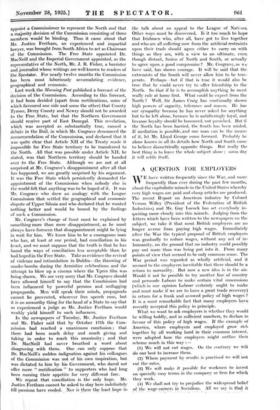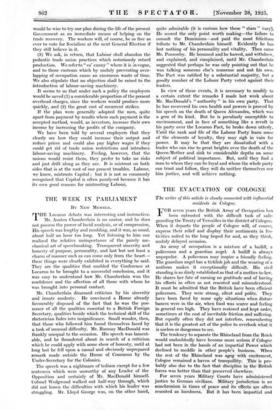A QUESTION FOR EMPLOYERS
•wE have written frequently since the War, and more frequently than ever during the past few months, about the capitalistic miracle in the United States whereby very high wages are paid and cheap articles are produced.
The recent Report on American industry by Colonel Vernon Willey (President of the Federation of British Industries) and Mr. Guy tocock has set everybody in- quiring more closely into this miracle. Judging from the letters which have been written to the newspapers on the subject, we take it that most British employers are no longer averse from paying high wages. Immediately after the War the typical proposal of British employers was gradually to reduce wages, without any act of in- humanity, on the ground that no industry could possibly pay out more than was being put into it. From many points of view that seemed to be only common sense. The War period was regarded as wholly artificial; and it seemed to the employers inevitable that there should be a return to normality. But now a new idea is in the air.
Would it not be possible to try another line of country and persuade Labour to make certain vital concessions (which in our opinion Labour certainly ought to make and must make if we are to have a great trade recovery) in return for a frank and avowed policy of high wages ? It is a most remarkable fact that many employers have recently accepted this policy in principle.
What we want to ask employers is whether they would be willing boldly, and in sufficient numbers, to declare in favour of this policy of high wages. If the example of America, where employers and employed grow rich together by all working hard in their common interest, were adopted here the employers might outline their scheme much in this way :- (1) We will not cut wages. On the contrary we will do our best to increase them.
(2) Where payment by results is practised we will not cut the -rates.
(3) We will make it possible for workmen to invest on specially easy terms in the company or firm for which they work. (4) We shall not try to prejudice the widespread belief of the wage-earners in Socialism. All we say is that it would be wise to try our plan during the life of the present Government as an immediate means of helping on the trade recovery. The workers will, of course, be as free as ever to vote for Socialism at the next General Election if they still believe in it.
(5) We ask, in return, that Labinir shall abandon the pedantic trade. union practices which notoriously retard production. We refer to " Ca' canny" where it is in vogue, and to those customs which by unduly preventing over- lapping of occupation cause an enormous waste of time. We also stipulate that no objection shall be raised to the introduction of labour-saving machinery.
It seems to us that under such 'a policy the employers Would be saved (1) a considerable proportion of the present overhead charges, since the Workers would produce more quickly, and (2) the great cost of recurrent strikes.
If the plan were generally adopted the men, quite apart from payment by results where such payment is the accepted method, would, as investors, increase their own income by increasing the profits of the company: We have been told by several employers that they clearly see how they could increase their 'output and reduce prices and could also pay higher wages if they could get rid of trade union restrictions and introduce labour-saving machinery. Feeling, however, that the unions would resist them, they prefer to take no risks and just drift along as they are. It is mistrust on both sides that is at the root of our present troubles. Labour, we know, mistrusts Capital ; but it is not so commonly recognized that Capital is often paralysed because it has its own good reasons for mistrusting Labour.























































 Previous page
Previous page